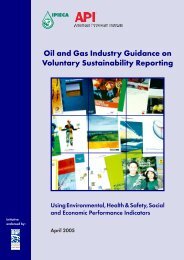Technology Cooperation and Capacity Building - CommDev
Technology Cooperation and Capacity Building - CommDev
Technology Cooperation and Capacity Building - CommDev
You also want an ePaper? Increase the reach of your titles
YUMPU automatically turns print PDFs into web optimized ePapers that Google loves.
TECHNOLOGY COOPERATION AND CAPACITY BUILDING… Case Study NinePT Caltex Pacific IndonesiaSkilled analysts study results from ‘logging tools’, which entails loweringsensitive electronic monitoring devices into wells to obtain informationabout underground geological formations. PT Caltex Pacific Indonesiaemployees receive an average of 110 hours training a year.horizontal drilling to reduce the need for road <strong>and</strong> siteclearings, <strong>and</strong> conducting carefully designed seismic surveys.The company <strong>and</strong> its shareholders are involved in manyinitiatives to study <strong>and</strong> safeguard tropical rain forests <strong>and</strong> theirunique flora <strong>and</strong> fauna. In 1979, CPI petitioned theGovernment of Indonesia to make the Zamrud Lakes, whichrest on top of an important oil discovery, a nature reserve.Today, CPI uses directional drilling to tap the oil field fromonshore. Other initiatives include support for a biodiversityproject on the isl<strong>and</strong> of Sulawesi, a rain forest exhibit <strong>and</strong>animal hospital at the Ragunan Zoo in Jakarta, rain foreststudies by experts from the New York Botanical Gardens inIndonesia, a clinic for rehabilitating orangutans in Kalimantan<strong>and</strong> global conferences in Indonesia on safeguarding great apes(1991), preserving rain forests (1993), <strong>and</strong> protecting theenvironment (1994). In 1991, CPI’s shareholders were keycontributors in developing the Oil Industry Operating Guidelinefor Tropical Rain Forests (published by E&P Forum).Human resource developmentFormer US Ambassador to Indonesia, Paul Wolfowitz, oncecalled CPI ‘a very big university on a vast campus,’ inrecognition of its commitment to training. This is reflectedby the small number of expatriate employees seconded fromits shareholders. In 1951, 200 of CPI’s 1400 employees werefrom its shareholding companies. Today, there are only some125 non-Indonesians out of a total CPI workforce of 6400.Nearly all CPI senior <strong>and</strong> intermediate managementpositions are held by Indonesians.CPI conducts a wide range of programmes to teachemployees basic skills, technical expertise <strong>and</strong> managementdevelopment. In 1993, for example, CPI employees received700 000 hours of training, an average of 110 training hoursper employee. CPI has been a leader in innovating suchprogrammes as ‘hot line’ maintenance training, whichenables its technicians to repair electrical cables withoutdisrupting the power supply to local oilfields. Its expatriatenationalmentor system has promoted technology transferthrough special training. For example, skills acquired bynational professionals in operating state-of-the-art 3-D <strong>and</strong>4-D seismic technology have become important resources forfinding new hydrocarbon reserves.In 1993, 25 CPI employees took part in on-the-jobtraining programmes in the United States, Canada, Australia<strong>and</strong> the United Kingdom in a number of disciplines,including exploration, construction, petroleum engineering,drilling, computers, finance, accounting, human resources <strong>and</strong>external relations. Chevron <strong>and</strong> Texaco also host a number oftechnical visits by CPI employees to their facilities every year.Increasingly, training is from one Indonesian to another,often from one generation to another, sometimes in thesame family. Many CPI professionals, such as seniorengineers <strong>and</strong> senior geologists, are second generation CPIemployees. Their fathers may have been clerks or fieldlabourers when CPI resumed operations after WorldWar II. Educational scholarships for employees <strong>and</strong> their‘<strong>Technology</strong> coooperation between oil companies within <strong>and</strong>outside Indonesia has significantly improved the managerial <strong>and</strong>operational capabilities of Indonesians over the past two decades.’‘<strong>Technology</strong> transfer <strong>and</strong> cooperation has been an effective wayof achieving mutual goals <strong>and</strong> benefits for both the Indonesiangovernment <strong>and</strong> for the oil companies.’‘<strong>Cooperation</strong> based on mutual benefit <strong>and</strong> trust has resulted inconsiderable cost reduction, <strong>and</strong> the effective, efficient <strong>and</strong> timelycompletion of many projects.’Ir Soepraptono Soeleiman,Expert Staff, Earth, Oil <strong>and</strong> Gas, Department of Mines <strong>and</strong> Energy,Secretary, Pertamina Board of Commissioners48


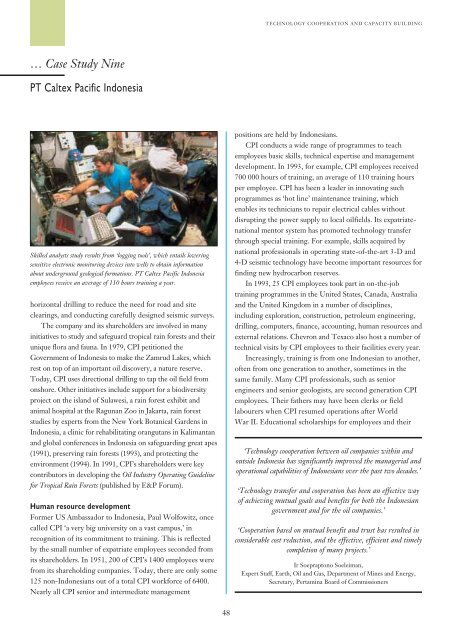
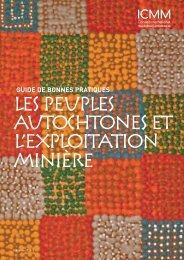
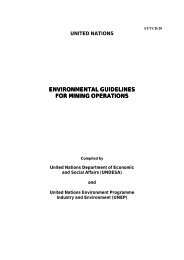
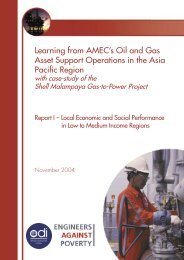
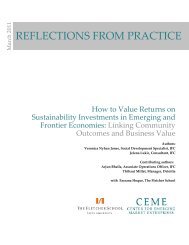
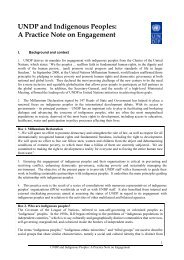
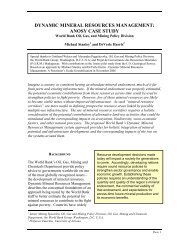
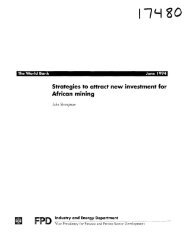

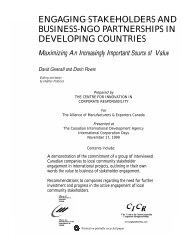
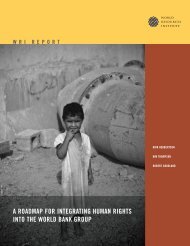
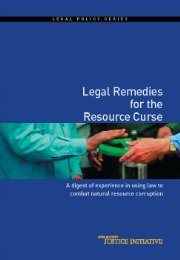
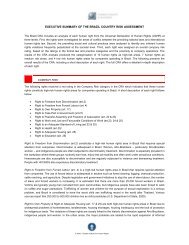
![[PDF] Community Development Toolkit - CommDev](https://img.yumpu.com/48616495/1/184x260/pdf-community-development-toolkit-commdev.jpg?quality=85)
